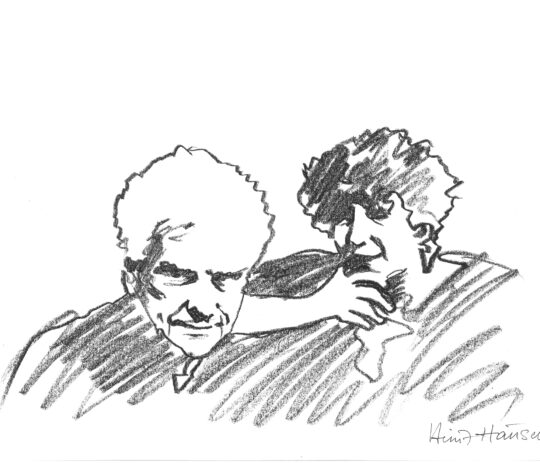
Tankred Dorst was born on December 19, 1925, in Oberlind near Sonneberg in Thuringia, the son of a factory owner. “I was born in a village on the Thuringian Forest, on the Franconian side …”, he will say in an often quoted introduction speech for the German Academy for Language and Poetry (1978), thus hinting at a motif that repeatedly assumes a central role in his work. After returning from captivity in 1947, he initially studied German and theater. He found his way to the theater through a student puppet theater in Munich, for which he wrote his first plays.
There he also met his partner and later wife Ursula Ehler, with whom he worked closely artistically since the early 1970s and who also assisted him in all his directing projects – such as “Ich- Feuerbach” (1987) or at the Ring in Bayreuth (2006). Dorst’s long and fruitful collaboration with Peter Zadek began as early as 1960 and resulted in the filming of his early success “Die Kurve” (with Klaus Kinski and Helmut Qualtinger, among others) as well as other television films (“Rotmord”, “Der Pott” and others).
In his work, Dorst always resisted classification into fixed categories. He took up mythical or historical material, wrote fairy tale plays and parables, and reacted – in his own way – to current political developments. Among his best-known works, besides Merlin (1981), are the revolutionary drama Toller (1968), the trilogy Auf dem Chimborazo/Die Villa/Heinrich oder Die Schmerzen der Fantasie (1975-1985), and the plays Karlos (1990) and Herr Paul (1994).
In 1999, the play Große Szene am Fluss, written under the impression of the Bosnian war, was premiered in Munich. In February 2005, the playwright celebrated another success with the premiere of his drama Wüste in Dortmund. “I myself vacillate between optimism and pessimism,” Dorst once said. “Every person has a personal utopia of how life should be, and then experiences disappointment that it is not so.
The extent to which Dorst shaped the theater of the postwar and reinvention era of Germany can be seen in the artists who brought it to the world: Peter Palitzsch, Patrice Chéreau, Robert Wilson, Hans Neuenfels, Dieter Dorn, Jürgen Flimm, Wilfried Minks, also Harald Clemen, Jossi Wieler, David Mouchtar-Samorai and many others. On Zadek’s initiative, the aforementioned Merlin, his opus magnum, was created. The work about the loss of the great utopias, uncoated nine hours long, has been staged by more than 20 directors all over the world after the fall of the Berlin Wall.
Playwriting alone was not enough for the man honored with numerous prizes – most recently the FAUST Prize in 2012; in addition to films and libretti (among others, a setting of his Parsifal was premiered in Hanoi in 2011), he was also active as a play director, as mentioned above; at the age of 80, he made his debut as an opera director with Wagner’s Ring in Bayreuth. And he was a discoverer and promoter: on the initiative of Manfred Beilharz, Tankred Dorst and Ursula Ehler were travelers and curators for the “New Plays from Europe” for 22 years. Dorst was also repeatedly invited as a lecturer, including at the local UdK – which was always special for an author who said of himself throughout his life: “It is not the author who seeks the story, but the story that seeks the author.” Tankred Dorst died in 2017.
Tankred Dorst/Ursula Ehler (c) Heinz Hauser